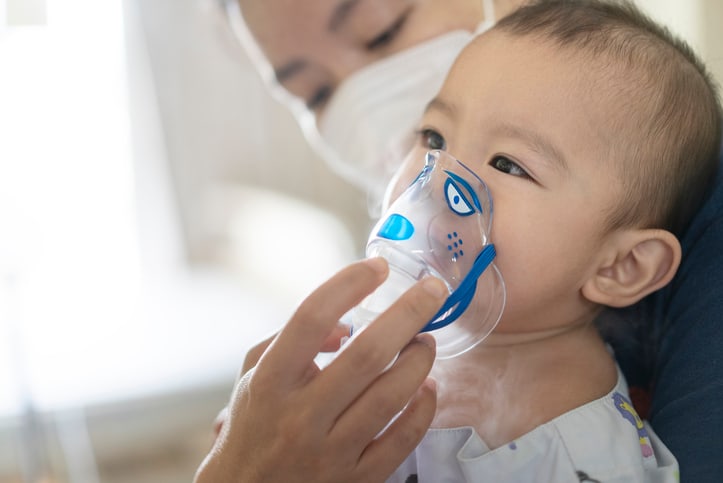
[6 min read]
In this article:
- The winter of 2022-2023 witnessed a “tripledemic” with the convergence of COVID-19, RSV, and influenza overwhelming health care facilities, physicians and care teams.
- The introduction of RSV vaccines for infants and pregnant people is a significant advance in pediatric healthcare and has lowered the burden of RSV-related illnesses and complications on families and care teams.
- A Providence Swedish pediatric infectious disease expert explains how the vaccines work and when you should schedule them for maximum protection.
Respiratory Syncytial Virus (RSV) represents a significant health threat to infants and young children and is one of the leading causes of severe lower respiratory tract infections globally. With symptoms ranging from mild cold-like manifestations to severe bronchiolitis and pneumonia, RSV can lead to serious complications, particularly in young infants and children with underlying health conditions. RSV hospitalizes approximately 58,000 children under five years of age in the United States annually.
Frank Bell, M.D., a pediatric infectious disease specialist at Providence Swedish Pediatric Specialty Care is a clinical associate professor at Washington State University’s Elson S. Floyd College of Medicine and Vice President of the Washington Chapter of the American Academy of Pediatrics. He has seen first-hand how the introduction of RSV vaccines for infants and pregnant mothers marked a significant advance in pediatric healthcare and has mitigated the burden of RSV-related illnesses and complications on health care teams, and more importantly, young patients and their parents.
RSV Vaccines and Their Introduction
The winter of 2022-2023 witnessed a “tripledemic” with the convergence of COVID-19, RSV, and influenza overwhelming healthcare facilities, physicians and care teams. The surge placed an unprecedented strain on pediatric admissions, leading to extended emergency care wait times and severe bed shortages, with some systems forced to set up overflow tents on hospital grounds.
As recently as five years ago, a monoclonal antibody RSV vaccine for infants would have been unimaginable. Today there are two long-acting monoclonal antibodies available: nirsevimab, which became available in July, 2023 for infants aged 0–7 months and for high-risk children aged 8–19 months and clesrovimab for infants aged 0–7 months, which was authorized by the FDA in June, 2025 for use in infants born during or entering their first RSV season. The maternal RSV vaccine, Abrysvo, received FDA approval in August 2023.
Evidence suggests that all three options provide protection for the bulk of RSV season, but immunization timing is critical: infants born between April and September should receive nirsevimab or clesrovimab immunizations in October or November; infants born during RSV season - October through March should receive their vaccination as soon after birth as possible; pregnant people should receive their vaccination between 32 and 36 weeks of pregnancy during the months of September to January.
Source: U.S. Centers for Disease Control and Prevention/RSVImmunoCalendar
Vaccination Success and Statistics
Since the introduction of RSV vaccines in late 2023, vaccination rates have seen encouraging growth, with early data indicating a promising uptake among pregnant women and infants. According to recent CDC reports, vaccination coverage for eligible infants has reached approximately 60%, with expectations for further increases as awareness and accessibility improve. With increasing coverage there is evidence of a real-world effect in reducing the rates of hospital admissions for young infants with RSV bronchiolitis.
Economic Benefits May Come with Increased Vaccination Rates, But There Are Challenges
The economic impact of widespread RSV vaccination is likely to prove beneficial. Though the vaccines are expensive, they may pay for themselves by keeping children out of the hospital where they may need expensive care. Some estimates of RSV treatment costs put the figure at billions of dollars annually. Preventive pediatric and maternal RSV vaccination can reduce these costs substantially and may extend to cost-benefits that include workforce productivity and reducing the economic strain on families affected by RSV-related hospitalizations.
Despite the successes, challenges remain in increasing vaccination rates, including issues related to vaccine distribution in rural and underserved areas, and vaccine hesitancy and misinformation. Efforts to increase public education about the safety and efficacy of RSV vaccines are crucial to overcoming these hurdles. Additionally, integrating RSV vaccination into routine prenatal and postnatal care can streamline the process and improve coverage.
Learn more and find a physician or advanced practice clinician (APC)
When you have questions or concerns about your child’s wellness, Swedish Pediatrics is here to help. Call today to schedule a visit.
You can also contact Swedish Primary Care to schedule an appointment with a primary care physician. If you or your child has an illness, you can connect virtually with your care team who can review your symptoms and give instructions and follow-up care as needed. With Swedish ExpressCare Virtual, you can receive treatment in minutes for common conditions such as colds, flu, urinary tract infections and more. You can use our provider directory to find a specialist or primary care physician near you.
Information for patients and visitors
Related resources
Struggling to make sense of the news around vaccinations and acetaminophen? A Swedish doc is here to
What to know about hand, foot, and mouth disease and how it spreads
For vaccine and health care guidance, trust the experts
Your kiddos have unique health needs from 6 to 12. Here’s some guidance to help them thrive.
This information is not intended as a substitute for professional medical care. Always follow your health care professional's instructions.
Providence Swedish experts in the media
Follow us on Facebook, Instagram and X.
About the Author
More Content by Swedish Pediatrics Team























